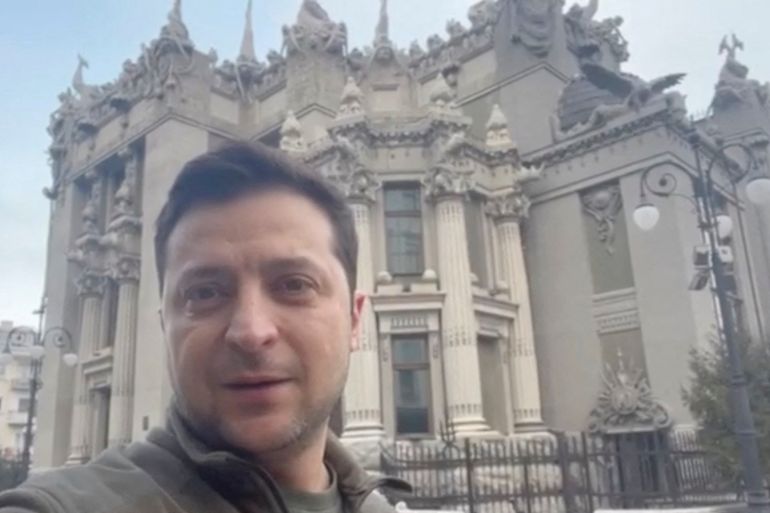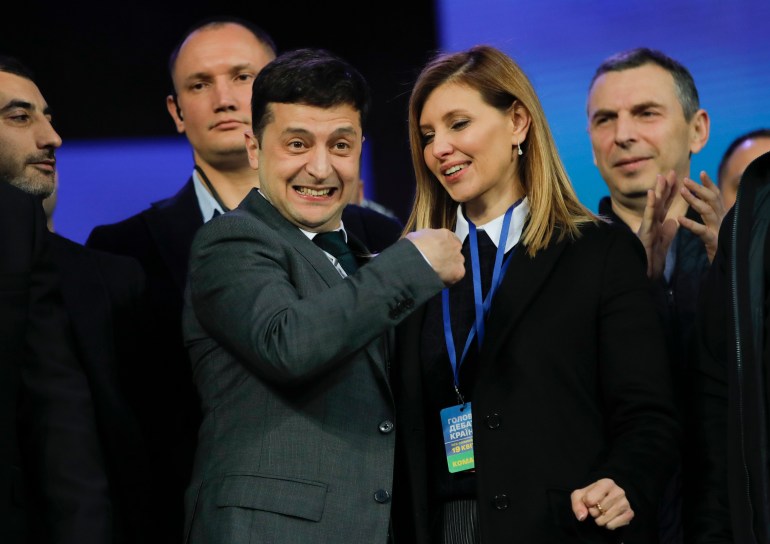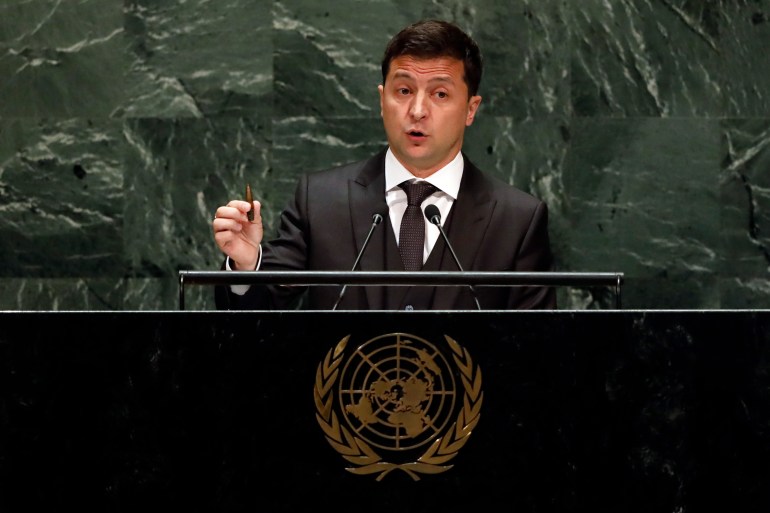Ukraine’s Zelenskyy: A wartime statesman for the social media age
Openness, grit and selfie videos. How Ukraine’s comedian-turned-president has become a symbol of national resistance.

Since Russia launched a full-scale invasion of Ukraine on February 24, Ukraine’s comedian-turned-president Volodymyr Zelenskyy is fast emerging – even among some of his harshest critics – as a symbol of resistance and unity.
Often dressed in a casual green military T-shirt, the 44-year-old has addressed the nation in a series of self-shot videos recorded on his phone and published on social media.
Keep reading
list of 4 itemsRussia-Ukraine war: List of key events, day 792
Risk of military incidents on Belarus-Ukraine border quite high: Lukashenko
Ukrainians sigh with relief as US unlocks aid but say it won’t repel Russia
In one such video shot outside in the capital, Kyiv, last Friday, he is surrounded by his key aides and says defiantly: “We’re all here. Our military is here. Citizens in society are here. We’re all here defending our independence, our country, and it will stay this way.”
The video quickly went viral and was seen as an act of bravery by Ukrainians.
“I don’t think our previous presidents would have stayed in Ukraine; they probably would have escaped,” says Elizabeth Tishchenko, a resident of Ukraine’s second-biggest city, Kharkiv.
Zelenskyy’s personable and impassioned speeches urging Ukrainians to take up arms and his refusal to leave Ukraine despite warnings from the United States that he is the Kremlin’s top target have won him many plaudits both at home and abroad.
“He’s the literal man on the street,” says David Patrikarakos, a British journalist and author of War in 140 Characters: How Social Media Is Reshaping Conflict in the Twenty-First Century. “He is saying, ‘I’m your president, I’m not hiding, I’m not going anywhere. I am not behind the desk or wearing a suit. I am here with the risk of being killed, like everybody else.’”
His approach stands in stark contrast to the grand official settings preferred by Russian President Vladimir Putin. Visitors to the Kremlin are forced to sit at the end of a specially designed six-metre-long table when meeting Putin, resulting in a series of awkward photo-ops. In recent weeks, the Russian president, who usually comes across as calm and calculated, has cut a seemingly paranoid figure prone to long, rambling pre-recorded speeches.
“When you see Zelenskyy running around in the street, you can’t help but compare him to Vladimir Putin who looks like a supervillain in his bunker, isolated, sitting at his long table,” says Patrikarakos.

‘I need ammunition, not a ride’
Just three years ago, Zelenskyy was a well-known comic actor, best known for playing a schoolteacher who wakes up to find he has been elected head of state after a video of him ranting against corruption secretly recorded by his pupils goes viral. But in 2019, he ran for the presidency, using much of the same anti-corruption rhetoric as his on-screen character, and stormed to a landslide victory over the incumbent president and oligarch Petro Poroshenko with 73 percent of the vote.
“I think people voted for him because they got sick of all these oligarchs being in power. They thought, ‘Let’s have a boxer in Kyiv and a comedian as president,'” says Tishchenko, referring to the former heavyweight boxer, Vitali Klitschko, who is currently the mayor of Kyiv.
After Zelenskyy came to power, the reality of politics set in, and the everyman image began to wear off as he dealt with an energy crisis and then a global pandemic. His popularity waned, hitting 31 percent in December 2021. Recent polling over the weekend, however, suggests that Zelenskyy’s wartime leadership has earned him an approval rating of 91 percent, three times what it was before the invasion.
“No one thought Zelenskyy could have done this, but he has morphed from comedian and accidental president to wartime statesman. No one saw this coming,” says Patrikarakos.
Igor Novikov, a former adviser to the president between 2019-2020 who oversaw US-Ukrainian relations, told Al Jazeera that the fact that Zelenskyy’s background is not in politics is a key factor in his early success as a wartime leader. “President Zelenskyy is just an ordinary guy from an industrial city in Ukraine; he’s not a seasoned politician. And that is Ukraine’s blessing: where others run abroad or hide behind bureaucracy, he just does what needs to be done.”
Hampus Knutsson, a crisis communication specialist at Wings Public Relations who has worked on political campaigns in Sweden, points out what Zelenskyy has done well so far. “Zelenskyy is open, clear and communicates frequently,” Knutsson says. “He is on the ground.”
On February 26, the Ukrainian embassy in the United Kingdom announced on Twitter that Zelenskyy had turned down an offer by the US to evacuate Kyiv. “The fight is here; I need ammunition, not a ride,” they quoted him as saying, before adding, “Ukrainians are proud of their President.”
“In a sense, in his sincere and no-nonsense approach, he is the true, undistorted image of [many of] the Ukrainian people [fighting] now,” says Novikov, adding that “his strength, courage and determination are what unites everyone.”

Inner circle
It is an image that has been influenced and honed by those in Zelenskyy’s inner circle, according to Novikov.
“He is surrounded not by politicians but by ordinary human beings. Some of them come from his production company, some come from show business, some come from the legal profession, but most of them have never had any previous experience in politics, and that gives them that willpower and courage to actually tackle the old system,” says Novikov, who himself comes from an academic and non-political background.
He describes the atmosphere in Zelenskyy’s inner circle during peacetime as friendly and, perhaps unsurprisingly, full of jokes. It is also unusually informal, with Zelenskyy insisting that those he meets refer to him with the informal word for “you”, Ty (Ты), as opposed to the formal Vy (Вы).
According to Novikov, what the world is seeing now is a wartime leader no longer restrained by the more scripted high-stakes diplomacy that preceded the invasion. “He gets emotional, especially in the run-up to the invasion, when he knew everything was about to happen,” Novikov says.
“He was actually really aggressive with his Twitter and his inner circle had to tone him down and they would find a lighter more political way of putting it, but now, obviously all bets are off.”

‘A new form of statesmanship’: Grit and authenticity
Novikov says that Zelenskyy has always taken a hands-on approach to social media and is always checking his feeds. “He prefers selfie-style videos and chooses to directly address his audience as much as possible because it’s him: he’s a human being, not a portrait,” he says.
For Tishchenko, who is in her early 20s, this communication style is a key factor in his current popularity. “His personal qualities are really showing now, his speeches are both serious but digestible; younger people really like this,” she says.
“It is always more important what you do than what you say. Zelenskyy does what he says,” says Knutsson, who believes his visible and open presence online is also about setting an example. “He shows both action and heroism – the exact kind of behaviour he wants from both his population and from the outside world. It increases the chances of getting just that.”
Patrikarakos describes Zelenskyy’s social media strategy over the past week as “a new idiom of diplomacy” and “a new form of statesmanship” where, in this current social media age, it is important for politicians to show a human side. “It’s all about being gritty, it’s all about being authentic,” he says. “We are dealing with a different public sphere [in 2022] with short attention spans.”
He says that Zelenskyy’s experience in television meant that he quickly understood that social media could be a powerful weapon in a war where Ukraine is both outnumbered and outgunned. Zelenskyy films himself on the street and “only has the podium for 30 seconds, but he remains casual and direct; these videos are designed to go viral”, Patrikarakos explains.
It is important to not underestimate the power of social media, he adds. “Don’t ever forget that this stuff changes policy and policy can get you stingers [air-defence systems] and javelins [anti-tank weapons systems].”
“In the end is it going to turn the tide of war?” Patrikarakos asks. “Probably not; in fact almost certainly not. But it’s made a difference. The reaction has been unprecedented.”
Mykhail Hontarenko, 17, from Odesa, believes that although Zelenskyy’s career in entertainment helps him deliver his lines on camera, he has been displaying genuine emotion. “I don’t think he is acting now; he is scared,” he says.
Even those who weren’t previously fans of the president are coming around. Artem Skorobagach is a 20-year-old student from Kharkiv who is now serving in the reserve defence forces. He says that in the past week he has seen a different side to Zelenskyy and that his displays of bravery and resolve have changed his opinion of him.
“At the start, he [Zelenskyy] looked like a populist to me. He promised a lot of things [that didn’t depend on him]. For example, he said the ongoing war with Russia can be stopped, we, the Ukrainian army, just have to stop shooting. What nonsense. That was one-sided shooting from Russians from the start,” he says.
But Skorobagach believes that the war and loss of human life have brought out a more human and patriotic side to the president, which is coming across in his televised addresses and on social media. This has made him much more relatable to Ukrainians facing the bitter realities of a full-scale invasion, he believes.
Since the invasion began one week ago, at least one million Ukrainians in a country of 44 million have already fled to neighbouring countries including Poland, Romania, Hungary, Slovakia and Moldova. Ukraine’s health ministry said on Sunday that 352 civilians – including 14 children – have been killed since the invasion began, but it is difficult to know the exact death toll. It is not clear how many Ukrainian and Russian soldiers have died so far.
“When Russia moved their forces to our border, Zelenskyy and the government did everything right, without panic. Even now, when they attacked, he is in Kyiv and looks confident, because he believes in our army and people,” Skorobagach says. “He inspires that whole nation, and we believe that he will not bend under the pressure and will not surrender the interests of our country.”
![Artem Skorobagach, 20, in his home in Kharkiv on February 27 is now serving in the reserve defence. He was not a fan of Zelenskyy but says since the invasion, he has seen a more human and patriotic side to the leader through his televised addresses and on social media [Courtesy of Artem Skorobagach]](/wp-content/uploads/2022/03/IMG_20220228_233333_851-1-1.jpg?w=770&resize=770%2C513)
Support from inside
Across Ukraine, there are displays of dogged resistance from the territorial forces and countless civilian campaigns and initiatives designed to support the war effort. There are queues for blood banks across the country as well as international support in the form of donations, clothes and other essentials pouring in from abroad. Tishchenko feels Zelenskyy is largely responsible for galvanising international efforts. “Many people believe in him; so far he has negotiated with many world leaders, he has secured weapons, food and equipment,” she says.
Even previous critics of Zelenskyy appear to be supportive of the leader. Olga Rudenko, the chief editor of the Kyiv Independent news website, tweeted on Friday that “President Volodymyr Zelensky has made many really bad mistakes, and I’m sure will make many more, but today he’s showing himself worthy of the nation he’s leading.”
But it hasn’t all been positive. Since the invasion, Zelenskyy has signed a decree prohibiting men between the ages of 18 and 60 from leaving the country in case they are conscripted. The implementation of this rule has drawn criticism from many families who have been forcibly separated from their men at the border as they attempted to flee the country. Olga Balaban, 26, who was separated from her 18-year-old brother at the Polish border, told Al Jazeera that she found the sweeping decree unfair. “I do not think it is humane to call up all men to fight,” she said. “Maybe some are sick or have mental health issues.”
Artem U is a 17-year-old student from Kyiv who fled with his mother and siblings to Poland. He says his family was initially sceptical of Zelenskyy’s governance. “Before the war, many people didn’t like him, but now they’ve changed their mind,” he explains.
According to Artem, his family didn’t approve of the fact that Zelenskyy was a comedian. They would have preferred an experienced politician or someone with a business background, but they now value his leadership. “He is a hero for us, we will vote for him in the next election,” he says.
Novikov believes the support of Zelenskyy’s family, friends and colleagues has been a crucial factor in his ability to perform under such pressure in recent days. “A lot of his strength comes from the team,” he says, highlighting, in particular, Andriy Yermak, a film producer and lawyer and now Zelenskyy’s chief of staff.
The former adviser acknowledges that he and others were initially critical of Yermak, believing he was overprotective of the president, but says, “We were wrong, and it shows now.”
“He’s the walls and the foundation that keep Zelenskyy’s sincerity and courage going,” Novikov adds.
But there is a long road ahead for Zelenskyy. Eight days into the invasion, Moscow claims that the Black Sea city of Kherson has fallen, while troops close in on major cities such as Mariupol and Kharkiv, where residents have come under heavy bombardment. A 64km-long armoured column is situated just outside Kyiv, but the Russian advance has been slowed by mechanical issues and determined Ukrainian resistance.
For the president to keep up his high-energy social media presence and high-level diplomatic relations against the backdrop of such a large-scale military invasion and threats to his own life will be a monumental task. But, for now, Ukrainians appear united behind their leader.